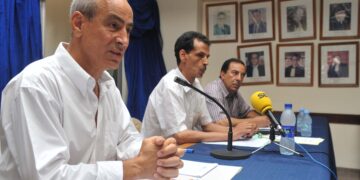Two years after the October 2, 2018, murder of Jamal Khashoggi, it seemed that Mohammed Bin Salman (MBS) and the Saudi government had managed to avoid any serious consequences or accountability for the killing. In the immediate wake of the murder, Western governments had imposed visa bans and economic sanctions against members of the Saudi "Tiger Squad" that planned and carried out the murder, but they hadn't sanctioned MBS, the man who ordered the murder, and they didn't suspend lucrative arms sales to the Saudi government.
With some success, civil society groups in the United States endeavored to reveal the truth of MBS' role in Khashoggi's murder. On February 26 2021, the Office of the Director of National Intelligence released a declassified, albeit redacted, report on the murder of Khashoggi in response to a lawsuit filed by the Open Society Justice Initiative (OSJI) under the Freedom of Information Act, supported by Democracy for the Arab World Now (DAWN) in an amicus brief. The ODNI Report merely confirmed what everybody knew – that MBS had ordered the murder of Khashoggi. Nevertheless, it represented an important, official confirmation.
Despite this victory in exposing the role of MBS in Khashoggi's murder, there was no serious effort to hold MBS himself accountable or to impose a meaningful sanctions against him. It was in this context, on October 20, 2020, two years after Khashoggi's murder, that DAWN and co-plaintiff Khashoggi's fiancé Hatice Cengiz filed a suit in the U.S. District Court for the District of Columbia against defendants MBS and 28 other high-ranking Saudi officials who participated in Kashoggi's murder, seeking damages, including punitive damages, for the abduction, torture, and murder of Khashoggi, and seeking discovery from American law enforcement and other government officials to prove that MBS and top Saudi leaders ordered and directed the murder of Khashoggi. DAWN and Cengiz's lawsuit, filed under the Alien Tort Statute, the Torture Victim Protection Act, and state law claims of tortious interference of contract, wrongful death, intentional infliction of emotional distress, loss of consortium and loss of society, constituted the most significant and only meaningful attempt to impose some measure of accountability on MBS.
Over the course of the lawsuit, the plaintiffs have faced and overcome significant legal hurdles in seeking to apply the rule of law to MBS, starting with service of process on defendants who weren't present in the United States. In the end, though, it was the US Government and the Biden Administration, not the courts or the law, that posed the most significant and perhaps insurmountable obstacle to applying the principle that no one is above the law.
On September 27, 2022, just days before the second deadline provided by the court for the Biden administration to weigh in on the question of head-of-state immunity for the Crown Prince, King Salman issued an unprecedented royal decree providing an exception to Article 56 of the Basic Law of Governance. The decree appointed MBS to act as prime minister, in an apparent effort to secure "head of government" immunity. The true and only purpose of the decree was crystal clear – to shut down a lawsuit that had dragged on for more than two years and threatened to hold MBS accountable the murder of Khashoggi.
Despite the Saudi Government's rejection of President Biden's plea only weeks before to increase oil production to ease the damaging inflation in the US and abroad, the U.S. Government chose to use the bogus royal decree as a pretext to renege on Presidential candidate's promise to hold MBS accountable for Khashoggi's murder. The U.S. Administration chose business as usual with the Saudi autocrat over the rule of law.
On November 17, 2022, the Biden Administration filed a Suggestion of Immunity on Behalf of Mohammad bin Salman (MBS) with the Court, stating that MBS "as a sitting head of government is immune from the jurisdiction of the US District Court."
Three weeks later, on December 6, 2022, the Court deferred to the US Government suggestion and dismissed the case against Crown Prince MBS and his two senior henchmen and co-defendants, Saud Al-Qahtani and Ahmed Al-Assiri. The court cited the suggestion of immunity as the basis for dismissing the lawsuit against MBS and the lack of personal jurisdiction against two of the other defendants who had filed an appearance in the lawsuit.
President Biden has framed the struggle for democracy over autocracy as the organizing and existential priority of U.S. foreign policy. In intervening in and short-circuiting DAWN's lawsuit seeking accountability for the murder of Khashoggi, the Biden Administration has betrayed that priority and that principle for short-term political considerations, and he has given despots everywhere who seek to engage in transnational violence against dissidents abroad an assurance that when the chips are down, the U.S. government will look the other way if convenient politically.
While the Biden Administration has dealt a blow to human rights and the rule of law, DAWN fights on. We will continue our efforts to seek accountability for the murderers of our founder Jamal Khashoggi. We will continue our efforts to uphold the rule of law regardless of the political implications and regardless of the U.S. or any government's efforts to subvert it. We will continue to advocate for democracy and human rights for all peoples in the Middle East and North Africa.
What follows is a chronology of legal filings in the case of Hatice Cengiz and Democracy for the Arab World Now (DAWN) v. Mohammed Bin Salman et al.
On October 20, 2020, two years after Khashoggi's murder, Democracy for the Arab World Now (DAWN) and co-plaintiff Kashoggi's fiance Hatice Cengiz, filed a complaint in the U.S. District Court for the District of Columbia against defendants Mohammed Bin Salman (MBS) and 28 other high-ranking Saudi officials who participated in Kashoggi's murder, seeking damages, including punitive damages, for the abduction, torture and murder of Khashoggi, and seeking discovery from American law enforcement and other government officials to prove that MBS and top Saudi leaders ordered and directed the murder of Khashoggi. DAWN and Cengiz's lawsuit, seeking damages under the Alien Tort Statute, the Torture Victim Protection Act, tortious interference of contract, wrongful death, intentional infliction of emotional distress, loss of consortium and loss of society,
On March 18, 2021, Attorney Michael Kellogg filed a Notice of Appearance as lawyer for MBS and two of his co-defendants, Saud Al-Qahtani and Ahmed Al-Assiri, both of whom had been identified for their role in the murder by in the UN Special Rapporteur's report.
On June 4, 2021, MBS filed a motion to dismiss the lawsuit claiming various defenses, including lack of jurisdiction of the court and sovereign immunity as head of state. Al-Qahtani and Al-Assiri filed a separate motion to dismiss on the same date. On September 14, 2021, DAWN and Cengiz filed an Opposition to Defendants' Motion to Dismiss. On November 9, 2021, MBS filed a Reply in Support of Motion to Dismiss. Al-Qahtani and Al-Assiri filed a separate Reply in Support of Motion to Dismiss.
On July 1, 2022, the Court (Judge John D. Bates) issued an order inviting the United States Government to indicate whether it would be issuing a Statement of Interest in the case pertaining to the act-of-state doctrine, head-of-state immunity and the sovereign interests of Saudi Arabia. The Court gave a deadline of August 1 for the Government to issue its Statement. In its Order, the Court scheduled a hearing on the defendants' motion to dismiss for August 31, 2022.
On July 18, prior to President Biden's scheduled trip to meet with MBS in Riyadh, the U.S. Justice Department requested a 60-day extension for the issuance of a Statement of Interest. That same day, July 18, the Court extended the deadline to October 3rd for the Government's response.
On July 20, 2022, the Court, in response to a joint statement from both Parties, rescheduled the hearing to November 2, 2022.
On September 27, just six days before the October 3rd deadline for the Biden administration to weigh in on immunity, King Salman issued an unprecedented royal Decree appointing MBS as acting Prime Minister, in an apparent effort to secure "head of government" immunity.
On September 27, just days before the October 3rd deadline for the Biden administration to weigh in on immunity, King Salman issued an unprecedented royal decree providing an exception to Article 56 of the Basic Law of Governance, which states that the King serves as prime minister. The decree appoints MBS to act as prime minister, in an apparent effort to secure "head of government" immunity.
On September 30, the Justice Department requested a 45-day extension to respond to the immunity question, citing the "new circumstances" of MBS' appointment as Prime Minister. On that same day, the Court granted the Justice Department's request for an extension of time to file the Statement of Interest and ordered the Parties to issue a Joint Statement on whether the hearing should be postponed until after the November 17th deadline for the U.S. Government to issue its Statement of Interest.
On October 3, 2022, Defendant MBS filed a Notice of Supplemental Authority stating that plaintiff Cengiz's case must be dismissed because she had failed to exhaust local remedies in Turkey. On the same day, October 3, 2022, Defendant MBS filed a Notice of Supplemental Authority informing the Court that MBS has been appointed Saudi Prime Minister and that, as a result, he had "status-based immunity," and the case against him must be dismissed.
On October 5, the Saudi government announced it would slash oil output at its meeting with OPEC member states, widely seen as a snub of U.S. requests for increased output to quell rising oil prices.
On October 5, 2022, the Court, in response to a joint statement from both Parties, rescheduled the hearing from November 2nd, to December 2, 2022.
On October 18, 2022, Plaintiffs filed a response to Defendants' Notice of Supplemental Authority Regarding Proceedings in Turkey, arguing [one line summary].
On October 19, 2022, Plaintiffs filed a response to MBS' Notice of Supplemental Authority Regarding Head of State Immunity, arguing [one line summary.
On November 3, 2022, defendant MBS filed a Motion for Leave to file responses in connection with October 3rd Notices of Supplemental Authority.
On November 4, 2022, the Court granted defendant MBS' Motion for Leave, and on November 8, 2022, rescheduled the hearing for December 9, 2022.
On Nov. 17, the Biden administration filed a Suggestion of Immunity on Behalf of Mohammad bin Salman (MBS). In the suggestion, Richard C. Visek, Acting Legal Adviser for the U.S. Department of State, wrote that, "Prime Minister bin Salman as a sitting head of government is immune while in office from the jurisdiction of the United States District Court in this suit."
On December 6, 2022, Judge Bates dismissed the lawsuit against MBS, al-Qahtani and al-Assiri,"in light of the Statement of Interest filed by the United States and the absence of any basis to assert personal jurisdiction over defendants alQahtani and al-Assiri." Despite his dismissal of the case, Judge Bates acknowledged "uneasiness" with his decision. "A contextualized look at the [Saudi] Royal Order," the Judge wrote, "thus suggests that it was not motivated by a desire for bin Salman to be the head of government, but instead to shield him from potential liability in this case."
On December 6, 2022, the Court canceled the hearing set for December 9, 2022.
DAWN remains determined to seek accountability against the murderers of Khashoggi. In a press release following the Court's decision, DAWN Executive Director Sarah Leah Whitson stated, "DAWN's lawsuit against Mohamed bin Salman (MBS) for his ruthless murder of Jamal Khashoggi is only one part of our continued efforts for justice and accountability for this crime, and the many other crimes the Saudi government is perpetrating against its own citizens. While we are disappointed in the decision, we will consider all options to continue our legal challenges to MBS's criminal behavior."







































